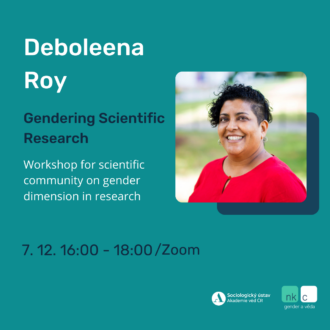
Deboleena Roy: Gendering Scientific Research
7. 12. 16:00 – 18:00/ Zoom
Workshop for the scientific community on the gender dimension in research. Online workshop of an American neuroscientist Deboleena Roy, which is part of educational activities of Centre for Gender and Science focusing on gender dimension in research.
Abstract:
From tracing the historical development of modern-day scientific culture and practices, to evaluating the presence of women in scientific careers, and to further producing epistemological and methodological critiques of scientific research, feminist scholarship has had a long tradition of working with the sciences. In part due to the impact of these critical interventions and to the rising awareness of gender-related inequities and health disparities globally, the next era of scientific training and interdisciplinary exchange requires us to meet the challenge of re-envisioning the relations between gender and science.
As a feminist scientist trained in neuroscience, molecular genetics, and reproductive biology, my scholarly and professional goals have been dedicated to engaging with these inquiries and moving beyond feminist critiques of science so as to develop feminist practices for the lab. This is an exciting time for training scientists and for creatively reframing our scientific inquiries to include what the organizers of this seminar series have referred to as the “gender dimension in research.” In this lecture, I want to suggest that as we embark upon these crucial projects, how we think about the concept of gender and the meaning of difference will deeply influence what scientific questions we end up asking and how we design our experimental frameworks. It will also influence how we interpret and implement our scientific findings. It would be prudent therefore to pause at this important juncture and reflect on current conversations taking place on women in science, gender in science, and the field of feminist science and technology studies to best prepare ourselves for the crucial work that lies ahead.
Bio:
Deboleena Roy currently serves as the Senior Associate Dean of Faculty for Emory College of Arts and Sciences. She is Professor of Neuroscience and Behavioral Biology (NBB) and Women’s, Gender, and Sexuality Studies (WGSS) at Emory University. She also serves as Associate Faculty in the Neuroscience Program, Graduate Division of Biological and Biomedical Sciences at Emory. Roy received her PhD in reproductive neuroendocrinology and molecular biology from the Institute of Medical Science at the University of Toronto. Her research and teaching explore interdisciplinary exchanges between the natural sciences and humanities, and she has dedicated her career to creating new conversations between feminism, postcolonial studies, philosophy of science, reproductive justice, molecular biology, and neuroscience.
Her research on synthetic biology has been supported by the Keck Foundation and her project “The Co-production of Knowledge by Reproductive Justice Advocates and Molecular Biologists” was funded by a National Science Foundation Scholars Award.
She has published dozens of articles in leading journals including the Journal of Biological Chemistry, Endocrinology, Neuroendocrinology, Hypatia: A Journal of Feminist Philosophy, Neuroethics, and Signs: Journal of Women in Culture and Society.
In addition, she has contributed to several anthologies including Handbook for Feminist Research: Theory and Praxis (2011); Neurofeminism: Issues at the Intersection of Feminist Theory and Cognitive Science (2012); Gendered Neurocultures: Feminist and Queer Perspectives on Current Brain Discourses (2014); Mattering: Feminism, Science, and Materialities (2016); and Matter (2016).
Her book Molecular Feminisms: Biology, Becomings, and Life in the Lab (2018) was published by the University of Washington Press and is available through open access. She is also a founding editor of the peer-reviewed open access journal Catalyst: Feminism, Theory, Technoscience.
In the past decade she has taken on an increasing number of academic leadership roles and is dedicated to supporting DEI initiatives, including women in STEM, and building trust and transparency in higher education.
